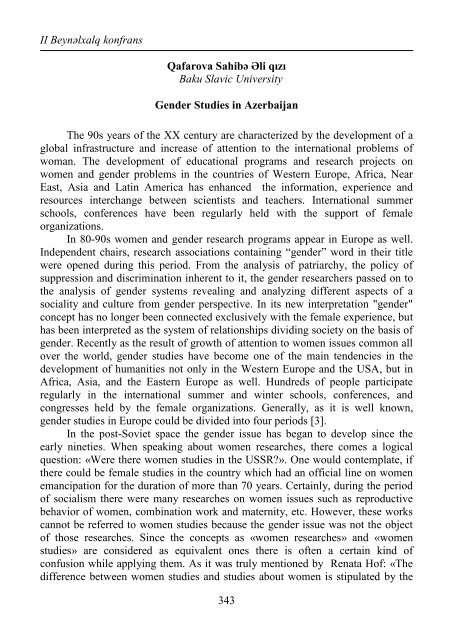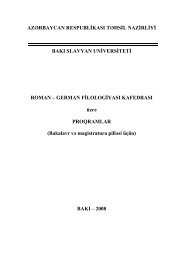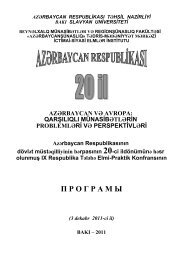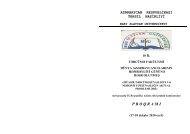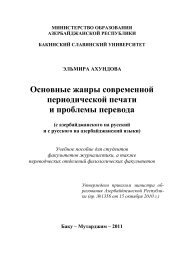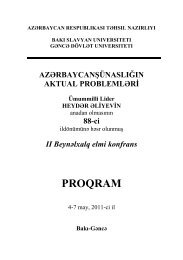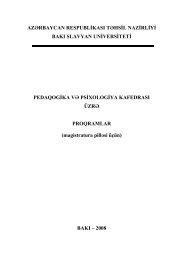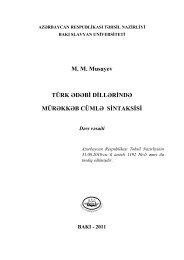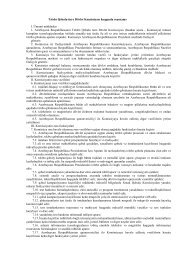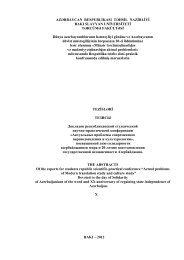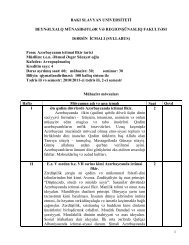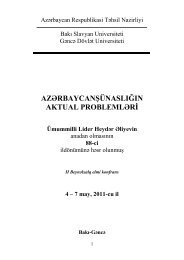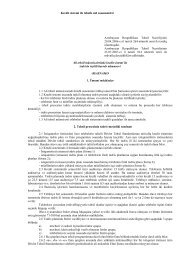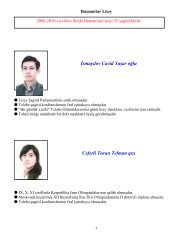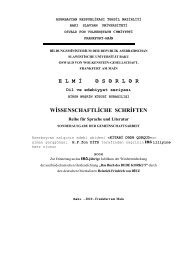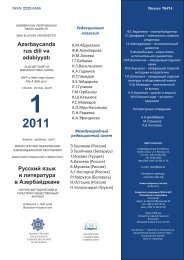- Page 1 and 2:
II Beynəlxalq konfrans Azərbaycan
- Page 3 and 4:
II Beynəlxalq konfrans H.H.Sadıxo
- Page 5 and 6:
II Beynəlxalq konfrans 5
- Page 7 and 8:
II Beynəlxalq konfrans 7
- Page 9 and 10:
II Beynəlxalq konfrans 9
- Page 11 and 12:
II Beynəlxalq konfrans 11
- Page 13 and 14:
II Beynəlxalq konfrans насло
- Page 15 and 16:
II Beynəlxalq konfrans даже т
- Page 17 and 18:
II Beynəlxalq konfrans Бакин
- Page 19 and 20:
II Beynəlxalq konfrans (1959), п
- Page 21 and 22:
II Beynəlxalq konfrans являе
- Page 23 and 24:
II Beynəlxalq konfrans В этом
- Page 25 and 26:
II Beynəlxalq konfrans азерб
- Page 27 and 28:
II Beynəlxalq konfrans filled with
- Page 29 and 30:
II Beynəlxalq konfrans Kaczyński
- Page 31 and 32:
II Beynəlxalq konfrans Azerbaijani
- Page 33 and 34:
II Beynəlxalq konfrans excessive.
- Page 35 and 36:
II Beynəlxalq konfrans Conclusions
- Page 37 and 38:
II Beynəlxalq konfrans массо
- Page 39 and 40:
II Beynəlxalq konfrans без уч
- Page 41 and 42:
II Beynəlxalq konfrans выход
- Page 43 and 44:
II Beynəlxalq konfrans 7. Абух
- Page 45 and 46:
II Beynəlxalq konfrans значи
- Page 47 and 48:
II Beynəlxalq konfrans разли
- Page 49 and 50:
II Beynəlxalq konfrans •трен
- Page 51 and 52:
II Beynəlxalq konfrans тембр
- Page 53 and 54:
II Beynəlxalq konfrans Суть з
- Page 55 and 56:
II Beynəlxalq konfrans Qorqud‖
- Page 57 and 58:
II Beynəlxalq konfrans форми
- Page 59 and 60:
II Beynəlxalq konfrans терми
- Page 61 and 62:
II Beynəlxalq konfrans Şagen, Tav
- Page 63 and 64:
II Beynəlxalq konfrans tarixi» nd
- Page 65 and 66:
II Beynəlxalq konfrans 3. Qədim t
- Page 67 and 68:
II Beynəlxalq konfrans безра
- Page 69 and 70:
II Beynəlxalq konfrans Толст
- Page 71 and 72:
II Beynəlxalq konfrans 7. Трои
- Page 73 and 74:
II Beynəlxalq konfrans народ
- Page 75 and 76:
II Beynəlxalq konfrans произ
- Page 77 and 78:
II Beynəlxalq konfrans yöntəmlə
- Page 79 and 80:
II Beynəlxalq konfrans kimi fəall
- Page 81 and 82:
II Beynəlxalq konfrans bunların b
- Page 83 and 84:
II Beynəlxalq konfrans Kamal Abdul
- Page 85 and 86:
II Beynəlxalq konfrans Məlum oldu
- Page 87 and 88:
II Beynəlxalq konfrans -Xatirə, u
- Page 89 and 90:
II Beynəlxalq konfrans Mikromətnd
- Page 91 and 92:
II Beynəlxalq konfrans döndərib
- Page 93 and 94:
II Beynəlxalq konfrans ―yaradıc
- Page 95 and 96:
II Beynəlxalq konfrans Mehrəliyev
- Page 97 and 98:
II Beynəlxalq konfrans vətən hə
- Page 99 and 100:
II Beynəlxalq konfrans The article
- Page 101 and 102:
II Beynəlxalq konfrans əlaqədard
- Page 103 and 104:
II Beynəlxalq konfrans Fuziallaşm
- Page 105 and 106:
II Beynəlxalq konfrans B. Yunusəl
- Page 107 and 108:
II Beynəlxalq konfrans 25. Тен
- Page 109 and 110:
II Beynəlxalq konfrans Əgər əd
- Page 111 and 112:
II Beynəlxalq konfrans Televiziyan
- Page 113 and 114:
II Beynəlxalq konfrans 8.Зак Ф
- Page 115 and 116:
II Beynəlxalq konfrans garden daha
- Page 117 and 118:
II Beynəlxalq konfrans fruit, forb
- Page 119 and 120:
II Beynəlxalq konfrans Məlikova Z
- Page 121 and 122:
II Beynəlxalq konfrans sərhədlə
- Page 123 and 124:
II Beynəlxalq konfrans tərəfind
- Page 125 and 126:
II Beynəlxalq konfrans həyata ke
- Page 127 and 128:
II Beynəlxalq konfrans Məmmədov
- Page 129 and 130:
II Beynəlxalq konfrans - Varşavad
- Page 131 and 132:
II Beynəlxalq konfrans etmiş poly
- Page 133 and 134:
II Beynəlxalq konfrans SUMMARY Par
- Page 135 and 136:
II Beynəlxalq konfrans ruh və s.
- Page 137 and 138:
II Beynəlxalq konfrans üslub nüm
- Page 139 and 140:
II Beynəlxalq konfrans onun müxt
- Page 141 and 142:
II Beynəlxalq konfrans tərcümə
- Page 143 and 144:
II Beynəlxalq konfrans tamamlamaql
- Page 145 and 146:
II Beynəlxalq konfrans ƏDƏBĠYYA
- Page 147 and 148:
II Beynəlxalq konfrans ayında Alm
- Page 149 and 150:
II Beynəlxalq konfrans nailiyyətl
- Page 151 and 152:
II Beynəlxalq konfrans - Diaspor q
- Page 153 and 154:
II Beynəlxalq konfrans Məmmədov
- Page 155 and 156:
II Beynəlxalq konfrans Müraciətd
- Page 157 and 158:
II Beynəlxalq konfrans əhəmiyyə
- Page 159 and 160:
II Beynəlxalq konfrans ciddiliyi b
- Page 161 and 162:
II Beynəlxalq konfrans nümunələ
- Page 163 and 164:
II Beynəlxalq konfrans Professor F
- Page 165 and 166:
II Beynəlxalq konfrans davranış
- Page 167 and 168:
II Beynəlxalq konfrans ƏDƏBĠYYA
- Page 169 and 170:
II Beynəlxalq konfrans potensialı
- Page 171 and 172:
II Beynəlxalq konfrans birləşmə
- Page 173 and 174:
II Beynəlxalq konfrans Məmmədova
- Page 175 and 176:
II Beynəlxalq konfrans соотв
- Page 177 and 178:
II Beynəlxalq konfrans burada "iri
- Page 179 and 180:
II Beynəlxalq konfrans Ölüm - D
- Page 181 and 182:
II Beynəlxalq konfrans tərəfdən
- Page 183 and 184:
II Beynəlxalq konfrans Məmmədova
- Page 185 and 186:
II Beynəlxalq konfrans dəyişdiri
- Page 187 and 188:
II Beynəlxalq konfrans xidmət gö
- Page 189 and 190:
II Beynəlxalq konfrans İnkişaf e
- Page 191 and 192:
II Beynəlxalq konfrans dili olan A
- Page 193 and 194:
II Beynəlxalq konfrans Ümumiyyət
- Page 195 and 196:
II Beynəlxalq konfrans mənaya dil
- Page 197 and 198:
II Beynəlxalq konfrans məcazlaşm
- Page 199 and 200:
II Beynəlxalq konfrans I. Vasitəs
- Page 201 and 202:
II Beynəlxalq konfrans I. Fars dil
- Page 203 and 204:
II Beynəlxalq konfrans هداد گ
- Page 205 and 206:
II Beynəlxalq konfrans Fransız di
- Page 207 and 208:
II Beynəlxalq konfrans poivron- bi
- Page 209 and 210:
II Beynəlxalq konfrans qəbiləsi
- Page 211 and 212:
II Beynəlxalq konfrans Xarici neft
- Page 213 and 214:
II Beynəlxalq konfrans sənəddə
- Page 215 and 216:
II Beynəlxalq konfrans üçün cə
- Page 217 and 218:
II Beynəlxalq konfrans ƏDƏBĠYYA
- Page 219 and 220:
II Beynəlxalq konfrans В этом
- Page 221 and 222:
II Beynəlxalq konfrans склад
- Page 223 and 224:
II Beynəlxalq konfrans müəyyən
- Page 225 and 226:
II Beynəlxalq konfrans anla kim, b
- Page 227 and 228:
II Beynəlxalq konfrans Cünki bağ
- Page 229 and 230:
II Beynəlxalq konfrans 13. M.Ə.Sa
- Page 231 and 232:
II Beynəlxalq konfrans инояз
- Page 233 and 234:
II Beynəlxalq konfrans Задне
- Page 235 and 236:
II Beynəlxalq konfrans 3. Щерб
- Page 237 and 238:
II Beynəlxalq konfrans Professor i
- Page 239 and 240:
II Beynəlxalq konfrans tələbəy
- Page 241 and 242:
II Beynəlxalq konfrans Sumqayıt,
- Page 243 and 244:
II Beynəlxalq konfrans qrupu vard
- Page 245 and 246:
II Beynəlxalq konfrans Azərbaycan
- Page 247 and 248:
II Beynəlxalq konfrans 4.Ə.Dəmir
- Page 249 and 250:
II Beynəlxalq konfrans Не мен
- Page 251 and 252:
II Beynəlxalq konfrans our point o
- Page 253 and 254:
II Beynəlxalq konfrans апрел
- Page 255 and 256:
II Beynəlxalq konfrans профе
- Page 257 and 258:
II Beynəlxalq konfrans Mustafayev
- Page 259 and 260:
II Beynəlxalq konfrans yanaşma me
- Page 261 and 262:
II Beynəlxalq konfrans Yeni dövr
- Page 263 and 264:
II Beynəlxalq konfrans cürət etd
- Page 265 and 266:
II Beynəlxalq konfrans iç dünyas
- Page 267 and 268:
II Beynəlxalq konfrans Son illərd
- Page 269 and 270:
II Beynəlxalq konfrans münaqişə
- Page 271 and 272:
II Beynəlxalq konfrans Qarabağ m
- Page 273 and 274:
II Beynəlxalq konfrans Southern Ca
- Page 275 and 276:
II Beynəlxalq konfrans по сра
- Page 277 and 278:
II Beynəlxalq konfrans И в об
- Page 279 and 280:
II Beynəlxalq konfrans Gəncənin
- Page 281 and 282:
II Beynəlxalq konfrans geniş sur
- Page 283 and 284:
II Beynəlxalq konfrans nurani şə
- Page 285 and 286:
II Beynəlxalq konfrans г. в ст
- Page 287 and 288:
II Beynəlxalq konfrans - како
- Page 289 and 290:
II Beynəlxalq konfrans имеет
- Page 291 and 292: II Beynəlxalq konfrans засед
- Page 293 and 294: II Beynəlxalq konfrans qovşağın
- Page 295 and 296: II Beynəlxalq konfrans əhəmiyyə
- Page 297 and 298: II Beynəlxalq konfrans baş artıq
- Page 299 and 300: II Beynəlxalq konfrans 8. ARDTA, f
- Page 301 and 302: II Beynəlxalq konfrans Несмо
- Page 303 and 304: II Beynəlxalq konfrans лидер
- Page 305 and 306: II Beynəlxalq konfrans Итак,
- Page 307 and 308: II Beynəlxalq konfrans ЛИТЕР
- Page 309 and 310: II Beynəlxalq konfrans ней мо
- Page 311 and 312: II Beynəlxalq konfrans Следо
- Page 313 and 314: II Beynəlxalq konfrans Азерб
- Page 315 and 316: II Beynəlxalq konfrans талан
- Page 317 and 318: II Beynəlxalq konfrans Он вид
- Page 319 and 320: II Beynəlxalq konfrans Alatuu, Ala
- Page 321 and 322: II Beynəlxalq konfrans etnonimin a
- Page 323 and 324: II Beynəlxalq konfrans Mənbələr
- Page 325 and 326: II Beynəlxalq konfrans bu və ya d
- Page 327 and 328: II Beynəlxalq konfrans Cəlil gül
- Page 329 and 330: II Beynəlxalq konfrans U.Tekkereyi
- Page 331 and 332: II Beynəlxalq konfrans Qeyd edək
- Page 333 and 334: II Beynəlxalq konfrans -De! Keşi
- Page 335 and 336: II Beynəlxalq konfrans Abbası ay
- Page 337 and 338: II Beynəlxalq konfrans Ekspozisiya
- Page 339 and 340: II Beynəlxalq konfrans Эконо
- Page 341: II Beynəlxalq konfrans жизнь
- Page 345 and 346: II Beynəlxalq konfrans commission
- Page 347 and 348: II Beynəlxalq konfrans Thus,Gender
- Page 349 and 350: II Beynəlxalq konfrans oyunu adı
- Page 351 and 352: II Beynəlxalq konfrans 6. Бере
- Page 353 and 354: II Beynəlxalq konfrans и разр
- Page 355 and 356: II Beynəlxalq konfrans являю
- Page 357 and 358: II Beynəlxalq konfrans прави
- Page 359 and 360: II Beynəlxalq konfrans ―Azərbay
- Page 361 and 362: II Beynəlxalq konfrans müxtəlif
- Page 363 and 364: II Beynəlxalq konfrans cümləsi i
- Page 365 and 366: II Beynəlxalq konfrans hədəf dil
- Page 367 and 368: II Beynəlxalq konfrans xüsusi adl
- Page 369 and 370: II Beynəlxalq konfrans bilər. Bun
- Page 371 and 372: II Beynəlxalq konfrans xüsusi ad.
- Page 373 and 374: II Beynəlxalq konfrans 6. Каза
- Page 375 and 376: II Beynəlxalq konfrans Главн
- Page 377 and 378: II Beynəlxalq konfrans справ
- Page 379 and 380: II Beynəlxalq konfrans состо
- Page 381 and 382: II Beynəlxalq konfrans Qədirli Al
- Page 383 and 384: II Beynəlxalq konfrans Перва
- Page 385 and 386: II Beynəlxalq konfrans Стран
- Page 387 and 388: II Beynəlxalq konfrans uyğun olur
- Page 389 and 390: II Beynəlxalq konfrans Bəstəkar
- Page 391 and 392: II Beynəlxalq konfrans SUMMARY Com
- Page 393 and 394:
II Beynəlxalq konfrans isim, sifə
- Page 395 and 396:
II Beynəlxalq konfrans Bu əlamət
- Page 397 and 398:
II Beynəlxalq konfrans ƏDƏBĠYYA
- Page 399 and 400:
II Beynəlxalq konfrans Грузи
- Page 401 and 402:
II Beynəlxalq konfrans ЛИТЕР
- Page 403 and 404:
II Beynəlxalq konfrans относ
- Page 405 and 406:
II Beynəlxalq konfrans Здесь
- Page 407 and 408:
II Beynəlxalq konfrans жизнь
- Page 409 and 410:
II Beynəlxalq konfrans 5. К. Па
- Page 411 and 412:
II Beynəlxalq konfrans Əslimiz on
- Page 413 and 414:
II Beynəlxalq konfrans Səfəvi-q
- Page 415 and 416:
II Beynəlxalq konfrans xalq hikmə
- Page 417 and 418:
II Beynəlxalq konfrans рубеж
- Page 419 and 420:
II Beynəlxalq konfrans опира
- Page 421 and 422:
II Beynəlxalq konfrans ЛИТЕР
- Page 423 and 424:
II Beynəlxalq konfrans Я царс
- Page 425 and 426:
II Beynəlxalq konfrans «Бесч
- Page 427 and 428:
II Beynəlxalq konfrans непри
- Page 429 and 430:
II Beynəlxalq konfrans в роде
- Page 431 and 432:
II Beynəlxalq konfrans на осн
- Page 433 and 434:
II Beynəlxalq konfrans сочет
- Page 435 and 436:
II Beynəlxalq konfrans типов
- Page 437 and 438:
II Beynəlxalq konfrans olmuş demo
- Page 439 and 440:
II Beynəlxalq konfrans böyük qaz
- Page 441 and 442:
II Beynəlxalq konfrans üçbucağ
- Page 443 and 444:
II Beynəlxalq konfrans tərəfdaş
- Page 445 and 446:
II Beynəlxalq konfrans etmək olma
- Page 447 and 448:
II Beynəlxalq konfrans iqtisadiyya
- Page 449 and 450:
II Beynəlxalq konfrans 5. http://w
- Page 451 and 452:
II Beynəlxalq konfrans Tanrıdan d
- Page 453 and 454:
II Beynəlxalq konfrans sözlər va
- Page 455 and 456:
II Beynəlxalq konfrans çərçivə
- Page 457 and 458:
II Beynəlxalq konfrans ölümlə b
- Page 459 and 460:
II Beynəlxalq konfrans Rəcəbli A
- Page 461 and 462:
II Beynəlxalq konfrans СБСЕ в
- Page 463 and 464:
II Beynəlxalq konfrans азерб
- Page 465 and 466:
II Beynəlxalq konfrans не про
- Page 467 and 468:
II Beynəlxalq konfrans SUMMARY Coo
- Page 469 and 470:
II Beynəlxalq konfrans verilir. «
- Page 471 and 472:
II Beynəlxalq konfrans kimi ət y
- Page 473 and 474:
II Beynəlxalq konfrans Rəhimova N
- Page 475 and 476:
II Beynəlxalq konfrans Beləliklə
- Page 477 and 478:
II Beynəlxalq konfrans Müzəffər
- Page 479 and 480:
II Beynəlxalq konfrans atributlar
- Page 481 and 482:
II Beynəlxalq konfrans Oğuz qəhr
- Page 483 and 484:
II Beynəlxalq konfrans görə, mö
- Page 485 and 486:
II Beynəlxalq konfrans текст
- Page 487 and 488:
II Beynəlxalq konfrans музык
- Page 489 and 490:
II Beynəlxalq konfrans intersectio
- Page 491 and 492:
II Beynəlxalq konfrans dünyanın
- Page 493 and 494:
II Beynəlxalq konfrans nümayənd
- Page 495 and 496:
II Beynəlxalq konfrans общес
- Page 497 and 498:
II Beynəlxalq konfrans униве
- Page 499 and 500:
II Beynəlxalq konfrans Rzayeva Nig
- Page 501 and 502:
II Beynəlxalq konfrans Догов
- Page 503 and 504:
II Beynəlxalq konfrans продо
- Page 505 and 506:
II Beynəlxalq konfrans doğrudur.
- Page 507 and 508:
II Beynəlxalq konfrans romantizm c
- Page 509 and 510:
II Beynəlxalq konfrans Sadıqova N
- Page 511 and 512:
II Beynəlxalq konfrans ―yoldan
- Page 513 and 514:
II Beynəlxalq konfrans Piyadaları
- Page 515 and 516:
II Beynəlxalq konfrans those facts
- Page 517 and 518:
II Beynəlxalq konfrans Amerika Mil
- Page 519 and 520:
II Beynəlxalq konfrans Rusiya: Rus
- Page 521 and 522:
II Beynəlxalq konfrans 4. Zbiqnev
- Page 523 and 524:
II Beynəlxalq konfrans görə, qur
- Page 525 and 526:
II Beynəlxalq konfrans məmur, 488
- Page 527 and 528:
II Beynəlxalq konfrans SUMMARY The
- Page 529 and 530:
II Beynəlxalq konfrans Araşdırma
- Page 531 and 532:
II Beynəlxalq konfrans İmran: 3/1
- Page 533 and 534:
II Beynəlxalq konfrans роль и
- Page 535 and 536:
II Beynəlxalq konfrans средс
- Page 537 and 538:
II Beynəlxalq konfrans парце
- Page 539 and 540:
II Beynəlxalq konfrans 4. Порч
- Page 541 and 542:
II Beynəlxalq konfrans Bu çalış
- Page 543 and 544:
II Beynəlxalq konfrans 1996 203.27
- Page 545 and 546:
II Beynəlxalq konfrans Ayrıca Aze
- Page 547 and 548:
II Beynəlxalq konfrans Cahandar a
- Page 549 and 550:
II Beynəlxalq konfrans səndən al
- Page 551 and 552:
II Beynəlxalq konfrans arasındak
- Page 553 and 554:
II Beynəlxalq konfrans Bu nümunə
- Page 555 and 556:
II Beynəlxalq konfrans созна
- Page 557 and 558:
II Beynəlxalq konfrans мельт
- Page 559 and 560:
II Beynəlxalq konfrans Эффек
- Page 561 and 562:
II Beynəlxalq konfrans интон
- Page 563 and 564:
II Beynəlxalq konfrans planının
- Page 565 and 566:
II Beynəlxalq konfrans Qeyd etmək
- Page 567 and 568:
II Beynəlxalq konfrans söz və ə
- Page 569 and 570:
II Beynəlxalq konfrans günü gör
- Page 571 and 572:
II Beynəlxalq konfrans Ç) Alqış
- Page 573 and 574:
II Beynəlxalq konfrans Süleymanov
- Page 575 and 576:
II Beynəlxalq konfrans демон
- Page 577 and 578:
II Beynəlxalq konfrans чищен
- Page 579 and 580:
II Beynəlxalq konfrans главн
- Page 581 and 582:
II Beynəlxalq konfrans контр
- Page 583 and 584:
II Beynəlxalq konfrans насто
- Page 585 and 586:
II Beynəlxalq konfrans азерб
- Page 587 and 588:
II Beynəlxalq konfrans библе
- Page 589 and 590:
II Beynəlxalq konfrans Все эт
- Page 591 and 592:
II Beynəlxalq konfrans указа
- Page 593 and 594:
II Beynəlxalq konfrans ġəmiyeva
- Page 595 and 596:
II Beynəlxalq konfrans увлеч
- Page 597 and 598:
II Beynəlxalq konfrans непол
- Page 599 and 600:
II Beynəlxalq konfrans 6. Руко
- Page 601 and 602:
II Beynəlxalq konfrans Məhz bu s
- Page 603 and 604:
II Beynəlxalq konfrans cəlb olund
- Page 605 and 606:
II Beynəlxalq konfrans mirasına n
- Page 607 and 608:
II Beynəlxalq konfrans ġükürbə
- Page 609 and 610:
II Beynəlxalq konfrans prOblemi yo
- Page 611 and 612:
II Beynəlxalq konfrans Sözlüyün
- Page 613 and 614:
II Beynəlxalq konfrans SUMMARY Thi
- Page 615 and 616:
II Beynəlxalq konfrans 1. Hər iki
- Page 617 and 618:
II Beynəlxalq konfrans kəsb edir.
- Page 619 and 620:
II Beynəlxalq konfrans ƏDƏBĠYYA
- Page 621 and 622:
II Beynəlxalq konfrans Uşaq nəsr
- Page 623 and 624:
II Beynəlxalq konfrans məhəbbət
- Page 625 and 626:
II Beynəlxalq konfrans ƏDƏBĠYYA
- Page 627 and 628:
II Beynəlxalq konfrans alınması
- Page 629 and 630:
II Beynəlxalq konfrans Bütün bun
- Page 631 and 632:
II Beynəlxalq konfrans işğal alt
- Page 633 and 634:
II Beynəlxalq konfrans artan riskl
- Page 635 and 636:
II Beynəlxalq konfrans verdiyi mə
- Page 637 and 638:
II Beynəlxalq konfrans the current
- Page 639 and 640:
II Beynəlxalq konfrans (азерб
- Page 641 and 642:
II Beynəlxalq konfrans квали
- Page 643 and 644:
II Beynəlxalq konfrans препо
- Page 645 and 646:
II Beynəlxalq konfrans полит
- Page 647 and 648:
II Beynəlxalq konfrans improvement
- Page 649 and 650:
II Beynəlxalq konfrans Yusifli, Za
- Page 651 and 652:
II Beynəlxalq konfrans ƏDƏBĠYYA
- Page 653 and 654:
II Beynəlxalq konfrans şeydən ö
- Page 655 and 656:
II Beynəlxalq konfrans Neologizm y
- Page 657 and 658:
II Beynəlxalq konfrans ни кто
- Page 659 and 660:
II Beynəlxalq konfrans мерны,
- Page 661 and 662:
II Beynəlxalq konfrans за суд
- Page 663 and 664:
II Beynəlxalq konfrans Xudiyeva Se
- Page 665 and 666:
II Beynəlxalq konfrans bütün zə
- Page 667 and 668:
II Beynəlxalq konfrans atanın-Dir
- Page 669 and 670:
II Beynəlxalq konfrans В резу
- Page 671 and 672:
II Beynəlxalq konfrans пробл
- Page 673 and 674:
II Beynəlxalq konfrans Роман
- Page 675 and 676:
II Beynəlxalq konfrans 6. Джаб
- Page 677 and 678:
II Beynəlxalq konfrans сыгра
- Page 679 and 680:
II Beynəlxalq konfrans Тем са
- Page 681 and 682:
II Beynəlxalq konfrans SUMMARY The
- Page 683 and 684:
II Beynəlxalq konfrans Bu metodlar
- Page 685 and 686:
II Beynəlxalq konfrans mübtəda b


